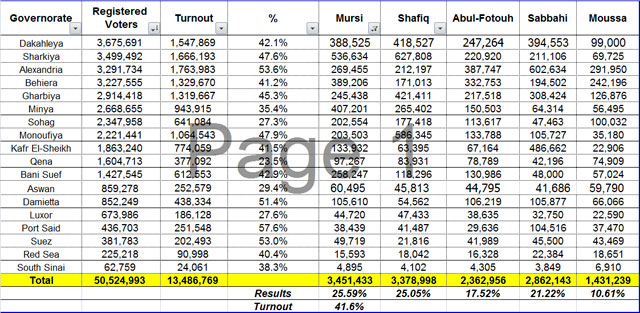This is the latest that I have been able to find on the results, courtesy of Ahram Online. It is important to bear in mind that the results from Cairo are not in. That should represent another 6 million votes based on Alexandria’s turn out. If Cairenes voted like Alexandrians, it could push Shafiq down dramatically.
13:30 Final results aggregated by Ahram Online of counted votes in 18 out of 27 governorates (Daqahliya, Sharqiya, Alexandria, Beheira, Gharbiya, Minya, Sohag, Menoufiya, Kafr El-Sheikh, Qena, Beni Suef, Aswan, Damietta, Luxor, Port Said, Suez, Red Sea and South Sinai) show that with 41.6 per cent turnout, Brotherhood candidate Mursi is in first place, followed by Mubarak’s last prime minister Shafiq, while the Nasserist candidate Sabbahi, the surprise of this election so far, has fallen back into third place – after the totals of Sharqiya and Sohag governorates were announced.
The results thus far are as following:
- Mursi 3,451,433 (25.59 per cent)
- Shafiq 3,378,998 (25.05 per cent)
- Sabbahi 2,862,143 (21.22 per cent)
- Abul-Fotouh 2,362,956 (17.52 per cent)
- Moussa 1,431,239 (10.61 per cent)
Read More



Recent Comments